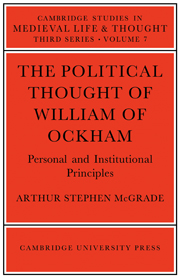Book contents
- Frontmatter
- Contents
- Preface
- Abbreviations
- 1 OCKHAM AS A POLITICAL THINKER
- 2 THE PROBLEM OF RADICAL ACTION
- 3 THEORY OF INSTITUTIONS: SECULAR AND SPIRITUAL GOVERNMENT
- 4 POLITICS AND PHILOSOPHY: NATURAL RIGHT AND THE ETHICAL BASIS FOR OCKHAM'S POLITICAL IDEAS
- 5 POLITICS AND THEOLOGY: SECULAR POLITICS AND CHRISTIAN VIRTUE
- CONCLUSION: OCKHAM AS A CONSTRUCTIVE POLITICAL THINKER
- Bibliography
- Index of passages in Ockham quoted, discussed, or cited
- Index of names
- Subject index
2 - THE PROBLEM OF RADICAL ACTION
Published online by Cambridge University Press: 16 October 2009
- Frontmatter
- Contents
- Preface
- Abbreviations
- 1 OCKHAM AS A POLITICAL THINKER
- 2 THE PROBLEM OF RADICAL ACTION
- 3 THEORY OF INSTITUTIONS: SECULAR AND SPIRITUAL GOVERNMENT
- 4 POLITICS AND PHILOSOPHY: NATURAL RIGHT AND THE ETHICAL BASIS FOR OCKHAM'S POLITICAL IDEAS
- 5 POLITICS AND THEOLOGY: SECULAR POLITICS AND CHRISTIAN VIRTUE
- CONCLUSION: OCKHAM AS A CONSTRUCTIVE POLITICAL THINKER
- Bibliography
- Index of passages in Ockham quoted, discussed, or cited
- Index of names
- Subject index
Summary
Nam contra errores pseudo-papae praefati
‘posui faciem meam ut petram durissimam’.
For against the errors of the forenamed
pseudo-pope ‘I have set my face like a flint’.
Epistola ad Fratres Minores (OPiii, 15)Pauci non deberent de victoria desperare,
immo unus solus de victoria sperare deberet.
A few ought not to despair of victory. Even
one man alone ought to hope for victory.
1 Dialogus 7, xlvii, fol. 147raThe starting point for Ockham's political thought both logically and psychologically was the problem of papal heresy. More precisely, he sought to bring about the downfall of John XXII, whom he regarded as a pseudo-pope because of his teachings on evangelical poverty and, later, the beatific vision. Before we consider Ockham's treatment of basic political institutions an attempt must be made to understand this striking initial ‘personal’ project. As a theologian and philosopher among a small group of excommunicate friars, how did Ockham think to bring down the reigning head of the Roman church? How could he think himself morally justified in such an undertaking? What obstacles did he recognize? How did he seek to overcome them? What significance does this venture in revolutionary ecclesiastical politics have for politics in general? These are the questions of the present chapter.
AUTHORITY AND UNDERSTANDING IN THE PROCESS OF DOCTRINAL CORRECTION
By the time he reached the sixth and seventh books of 1 Dialogus, Ockham was ready to discuss action against a heretical pope and his followers as if such action could be taken without seriously disturbing the life of the church.
- Type
- Chapter
- Information
- The Political Thought of William Ockham , pp. 47 - 77Publisher: Cambridge University PressPrint publication year: 1974

